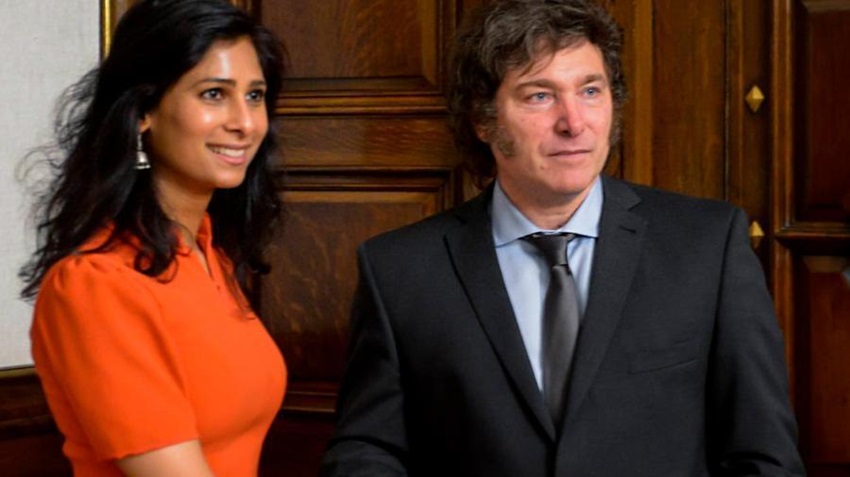
There were no reports of the meeting between the second most important official of the International Monetary Fund (IMF), Gita Gopinath, and the Argentine president Javier Milei. A photo, a video, a tweet and a declaration of “excellent and substantive meeting” by the Minister of the Interior, Guillermo Francos.
The negotiations are secret, behind the backs of the working people who are the main victims of the program with the IMF. But in addition, the axis of the visit was political: the Milei government, with Minister Luis Caputo at the helm, boasts of seeking “a faster and stronger adjustment than the organization itself demands,” but the Fund not only seeks money, also guarantee the conditions of that domain. It is explicit colonialism.
The most extensive meeting was with the Minister of Economy himself the day before and with the head of the Central Bank, Santiago Bausili, to review the numbers of the Argentine economy meticulously. Caputo later took the opportunity to ensure that the Fund would be open to the possibility of moving forward with a new agreement and a possible disbursement. But the details are few and it would seem that it is more about Luis Caputo’s desire for debt than a real possibility.
At this Thursday’s meeting, Gita Gopinath was received at the Casa Rosada by Javier Milei and then held a meeting with the Chief of Staff, Nicolás Posse, and the Minister of the Interior, Guillermo Francos. What is the objective of so many protocol meetings?
The government shows the numbers of the adjustment, but the Fund has doubts about the political and social viability, and presses for more devaluation. After the “caputazo” in December, where the price of the official dollar rose more than 118%, the monthly devaluation pattern is 2%, very far from an inflation between 15% and 20% monthly. This appreciates the exchange rate and exhausts the accumulation of reserves, at a time when “the countryside” will also press for greater exchange rate profitability to liquidate the heavy harvest. But a new devaluation would accelerate prices even more.
For this reason, they seek to eliminate the “export dollar” and aim for June. This is because currently 20% of foreign currency is settled in the Cash Settlement market, which implies a drain on the Central Bank, which can only appropriate 80% of the foreign currency generated by exports, so it will cost more to accumulate. reservations onwards.
The IMF is worried and wants certainties. The Government lost the battle for the “leo omnibus” and the organization sees a lack of political support. The electoral result of the runoff begins to blur in the loss of support of a sector of the population for Milei, while rejection of its adjustment policies and popular organization grows.
At the end of January Caputo and Milei closed the commitment with the international organization for a new disbursement of US$ 4.7 billion, which however will essentially be used to pay maturities of the stand-by program, contracted by Mauricio Macri. That is why of this total, there is only a remainder of US$ 2,000 million to face payments for that amount in April. The organization had approved the shock adjustment through devaluation, inflationary liquefaction and tariff increases.
The result was the largest real cut in primary spending in January in 30 years. In that month, inflation above 20% and the freezing of spending allowed the government to obtain a drop of almost 40 points in spending in real terms, as estimated by IARAF. The items that were reduced the most were contributory retirements and pensions, energy subsidies, real direct investment and total transfers to provinces, which accounted for 70% of the adjustment.
In other words, Milei guaranteed the financial surplus with the hunger of retirees. For every $100 of financial surplus obtained, $64 was taken from retirees. In total, the State stopped spending $750,000 million (in relation to what was allocated for retirements in January 2023 updated for inflation). At the same time, debt interest payments showed an abrupt jump (139.1% in the year-on-year comparison).
The fiscal objective that the government promised the Fund is a 2% primary surplus (not counting debt interest) by 2024 and an accumulation of reserves of US$ 10 billion. So that? To guarantee payments of the external debt, both with the IMF itself and with external private creditors, whose maturities will begin to increase in the coming years.
While Milei plays at being the “best student” of the IMF and financial capital, former president Cristina Fernández published a letter last week in which she warns about the “third debt crisis” and talks about the problem of debt with the organization but He refuses to ignore it. She was a serial payer of the debt and proposes to continue paying that scam, as she did during her governments and that of Alberto Fernández.
To truly reject the adjustment, and the agreement with the IMF, the way is popular mobilization for sovereign ignorance of the debt. This is a first step, as an inseparable part of a set of measures such as the nationalization of foreign trade and banking under the control of the workers to develop an alternative response to the crisis and that this time the workers will not pay for it. A program based on the interests of working people and not international financial capital.
Source: www.laizquierdadiario.com

